#meronym
Explore tagged Tumblr posts
Text

my coworkers all know each other but none of us consistently front enough to get to know them and it sucks
0 notes
Text
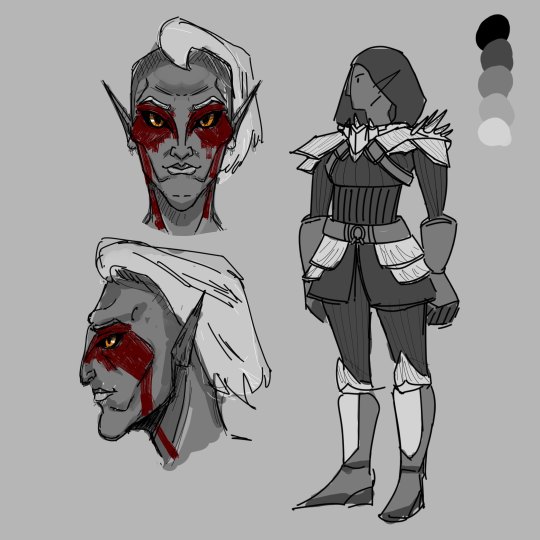
i believe in bosmer superiority o7
#tes#the elder scrolls#dragonborn#skyrim#Elder scrolls#artists on tumblr#digital art#fan art#art#Bosmer#oc meronym
16 notes
·
View notes
Text
Remembering Perspective When Writing Descriptions
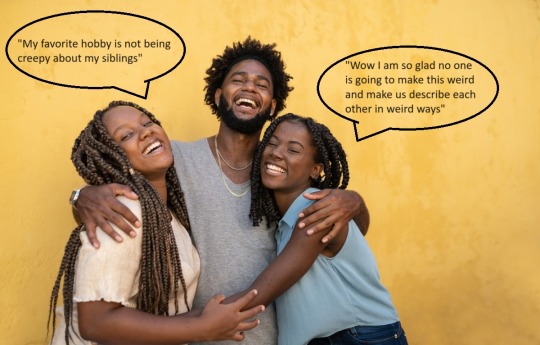
Just a short pet peeve of mine, inspired by a shower thought, where I remembered the most terrifying description I'd ever read.
It wasn't bad, or even horror. It was well written.
However. The POV character described his *sister* in a way akin to this (my recreation, not the actual text):
Braden met his sister at the gate. They'd been apart for several years, and in that time, she had truly become a woman. Her curves had filled out, and her red silk dressed strained across her tight figure. Her long black curly hair shone in the late evening light, while her blue eyes watched him intently.
No, this wasn't a brocon thing. The (male) writer was just horny for his female character and ... kinda forgot that his MC, her brother, would not feel the same way.
Now, of course siblings growing up together are going to notice the other one maturing, but it's not going to be ... that. This is how I describe 17-year-old Uileac looking at his little sister, 13-year-old Cerie, in 9 Years Yearning:
She'd shot up in height this past year - almost as tall as him, to his dismay. Whatever they were feeding her in the meronym was quite good for her metabolism, as she'd put on a bit of healthy weight. Her cheeks were losing their baby roundness, and the autumnal light accentuated the sharp intelligence behind her green eyes.
In this description, you can feel Uileac's paternal attitude toward his little sister. "Oh, she's put on a bit of weight and isn't a total twig anymore! I'm glad they're feeding her well. Her face looks more adult. Fuck, she's almost as tall as me now ... I wish I weren't so goddamn short ...."
This is a much more normal way for siblings to talk about each other, if a bit more "dad mode" than the typical older brother.
Siblings who grew up together are not going to say "holy shit I can really tell my sister has become a woman, wow her dress is tight over her curves." If my brother had said that about me while we were kids, I'd throw up and dump a pot of soup over his head.
This kind of thing is generally accidental and has to do with how *you* feel about a character. But the thing is that even the sexiest femme fatale is just going to be Jennifer, The Stupid Annoying Sister, to their sibling. Our brains are literally wired not to see our siblings as sexy if we grew up with them.
There are many other ways that you must take perspective into consideration when writing descriptions. Here are just a few of them.
Sexual attraction/orientation
You're going to focus on different things if you're sexually attracted to someone; namely, you'll focus in on things like breasts, legs, abs, etc. You'll also likely devote more attention to describing people of your particular sexual orientation than you would one that you are not attracted to, and you will focus on different things.
This is part of why we hate "men writing women:" they describe every woman as if they want to fuck them. (See the first example.) It has to do with the places that their gazes naturally linger on any woman, which is what they consider important and what they focus on.
But the thing that they miss is that just because we are sexually attracted to a specific gender does not mean we would want to bang anyone of that gender. I am a lesbian, but the way I would describe my mom or my therapist is vastly different than how I would describe a woman I am actually attracted to.
Romantic interests should get a more sexualized gaze; not exploitative, just more in-depth, and with more focus on their figure, specific details, etc. Everyone else should get a more basic look at eyes, hair color, height, build, and so on.
Feelings about a particular person
You're going to be more forgiving and complimentary toward someone you care about than someone you hate. Things that would be charming on a friend will be downright annoying on that one asshole at work who always throws projects to you at 5pm on a Friday.
A lover's thick eyebrows might be called "dashing" or "strong," while on an enemy, they'd be "overbearing" and "harsh." Your bestie's lisp is cute, while it seems babyish on your school rival. Your dad's meandering sentences give him a sense of harmless musing, but they make someone else look like an idiot.
If you have a character that is prejudiced toward a given group, they are always going to describe that group more harshly than they would a favored group. If they don't like authority figures, a police officer leaning toward them will seem menacing, when they wouldn't even notice it otherwise.
It can be very fun to give two characters similar traits but describe them differently based on the POV character's perspective of them. Readers might not even realize that it's the exact same physical feature!
Previous experiences at a given place
When describing settings, we're going to give more attention to somewhere we care about, like our home. I imagine you can tell me about every chip in the paint in your bedroom, or that one weird stain in the floorboard that you've tried everything to fix. Many times, this is a good time to add depth to the character's backstory by briefly mentioning previous occurrences there.
Would you notice any of those things about a place you're visiting for the first time? Probably not. You'll give a more global attention to the scene and provide impressions, not specifics.
Depending on how nervous or adventurous you are, you'll look for similarities or differences to things that you're accustomed to. You might compare it to other places you have been, trying to get a frame of reference.
If you're on a vacation and were really looking forward to coming to this specific spot, you will likely hone in on exactly what you came to see, whether that's the scene from a particular hilltop or a cafe, and this will get the most description.
Current Mood
Descriptions change with a character's mood, even if they've been in that place a millions times. People just notice different things depending on their mood; if they're happy, they'll look for things that support that mood, while if they're upset, they're pointing out the negatives.
For example, consider someone walking into a court room when they are on trial versus when they are there as a simple court reporter. The person on trial is probably going to be glancing longingly at the door, picking out the angry faces of observers (or assuming the observers are angry), focusing attention on the security guards, staring at the plaintiff with hate in their eyes.
The court reporter will likely pick out anyone they know in the room before looking at anything else. Then, they'll check out the defendant and plaintiff with idle curiosity. Since they are more familiar with the room, they'll gloss over the boring details that they have already seen a million times, giving them only a cursory once-over to see if anything has changed.
Current Need
Your character's objectives need to taken into consideration as well. As an example, remember the last time that you really needed to pee while you were out. Were you slowly and casually admiring the scenery? No! You were hunting for the bathroom. If literally anything registered for you, it was anything that looked vaguely bathroom-sign-shaped. Everything around that bathroom sign, and on your path toward the bathroom, got more attention and description to you than anything else.
Your character's interests
When describing a scene, you don't need to take time and define every single little thing in a character's path. It's annoying and overwhelming. You need to give us a basic overview (it's a forest, it's a grocery store, it's an abbatoir) and then hone in on the specific details that your character finds interesting in order to fill out the entire scene.
We, as people, focus on things we care about, things that we feel are relevant to us. Different people will notice completely different things when they walk into the same room. An animal trainer will appreciate a big pet bed and an ergonomic food bowl. An artist will admire the artwork on the walls. A computer nerd is going to roll their eyes at the scuffed-up Mac laptop.
This doesn't mean that you can't describe other things, too; it just means that your character's attention is going to be drawn to stuff that they, in particular, like or dislike.
Things like where a character's gaze lands, how they describe things, and how much detail they give to any particular element are an important part of secondary characterization: how we get to know a character beyond what they do or tell us. It helps to create a fuller picture of their relationships, their interests, and their thought process, and it deserves just as much attention as actions and dialogue.
If you enjoyed reading this, perhaps you'll consider purchasing my book, 9 Years Yearning. No weird sibling vibes I prommie
#writing#creative writing#writers on tumblr#fanfic#writing advice#writing tips#on writing#writing resources#writers on writing#writing reference#writing stuff#writing things#about writing#writing problems#writer problems#writer stuff#writerscommunity#writblr#writing community#writerblr#writing blod#beginner writer#tumblr writers#young writer#writer#writers#writers life#writer things#writing life#topazadine writes
319 notes
·
View notes
Note
Cyrus just stands there looking at the robot - or what he assumes is a robot, although he's never seen one quite like this before. His office has been getting a lot of robot visitors as of late, including the ones living there now, so he supposes the appearance of this one shouldn't be all that surprising.
When he speaks, his words come across telepathically, directly into the robot's mind. "Are you lost and looking for your way out of here? Or are you looking to move in too?"
@the-haunted-office
Pollux nearly jumped out of his frame when he heard a voice. Not because he wasn't expecting someone to speak, but because he wasn't expecting someone to speak in his head.
"Uh, well, I'm actually trying to figure out where I am and how I got here." His comms weren't working. Well, they were, but there was no signal. Dead giveaway that he was either on another world, in another dimension, in another time, or some combination of those.
This WOULD happen to me, he thought. Of those options, another dimension was the worst for him. Another world? Artax could easily come and get him. Another time? A little more difficult, but still doable (the Meronym was the only ship in the Rovarian fleet capable of time travel, as that was its primary purpose. Its missions were all classified. Only Spirit and Opportunity knew those details).
But another dimension? As of now, the Rovarians had no way to even pinpoint another dimension, let alone send a ship there. If that was the case, he might very well be here for a long time, if not eternity.
Whichever situation it was, a part of him was excited. He was a scientist at heart, and this was the (no pun intended) opportunity of a lifetime. And here he was making unofficial First Contact with a new race!
"Could, uh.....could you maybe tell me that? Oh, my name is Pollux, by the way. Chief Science Officer of the RSS Artax."
18 notes
·
View notes
Text
It's just occurred to that I've always considered "your other half" as some form of meronymous address. I've only ever used the phrase when I've invited a couple to a thing and only one of them shows up and "your" is referring to the couple, not the individual. I'm having trouble articulating my thoughts beyond this, but in short half of 2 is still a whole 1.
I don't mean to detract from message above--you absolutely don't need anyone else to be a complete individual--I'm just musing to myself about my relationship with the phrase.
Friendly reminder that humans are fully whole and autonomous beings without needing a romantic partner.
Your romantic partner is not your "other half".
You're not half of a human without a romantic partner.
You do not need someone else to "complete you".
You're already complete.
You DO need social connections as a human.
But that does NOT mean you absolutely NEED a romantic relationship.
Romance and romantic relationships are not a requirement to be happy.
1K notes
·
View notes
Text
For more open and equitable public discussions on social media, try “meronymity”
New Post has been published on https://sunalei.org/news/for-more-open-and-equitable-public-discussions-on-social-media-try-meronymity/
For more open and equitable public discussions on social media, try “meronymity”

Have you ever felt reluctant to share ideas during a meeting because you feared judgment from senior colleagues? You’re not alone. Research has shown this pervasive issue can lead to a lack of diversity in public discourse, especially when junior members of a community don’t speak up because they feel intimidated.
Anonymous communication can alleviate that fear and empower individuals to speak their minds, but anonymity also eliminates important social context and can quickly skew too far in the other direction, leading to toxic or hateful speech.
MIT researchers addressed these issues by designing a framework for identity disclosure in public conversations that falls somewhere in the middle, using a concept called “meronymity.”
Meronymity (from the Greek words for “partial” and “name”) allows people in a public discussion space to selectively reveal only relevant, verified aspects of their identity.
The researchers implemented meronymity in a communication system they built called LiTweeture, which is aimed at helping junior scholars use social media to ask research questions.
In LiTweeture, users can reveal a few professional facts, such as their academic affiliation or expertise in a certain field, which lends credibility to their questions or answers while shielding their exact identity.
Users have the flexibility to choose what they reveal about themselves each time they compose a social media post. They can also leverage existing relationships for endorsements that help queries reach experts they otherwise might be reluctant to contact.
During a monthlong study, junior academics who tested LiTweeture said meronymous communication made them feel more comfortable asking questions and encouraged them to engage with senior scholars on social media.
And while this study focused on academia, meronymous communication could be applied to any community or discussion space, says electrical engineering and computer science graduate student Nouran Soliman.
“With meronymity, we wanted to strike a balance between credibility and social inhibition. How can we make people feel more comfortable contributing and leveraging this rich community while still having some accountability?” says Soliman, lead author of a paper on meronymity.
Soliman wrote the paper with her advisor and senior author David Karger, professor in the Department of Electrical Engineering and Computer Science and a member of the Computer Science and Artificial Intelligence Laboratory (CSAIL), as well as others at the Semantic Scholar Team at Allen Institute for AI, the University of Washington, and Carnegie Mellon University. The research will be presented at the ACM Conference on Human Factors in Computing Systems.
Breaking down social barriers
The researchers began by conducting an initial study with 20 scholars to better understand the motivations and social barriers they face when engaging online with other academics.
They found that, while academics find X (formerly called Twitter) and Mastodon to be key resources when seeking help with research, they were often reluctant to ask for, discuss, or share recommendations.
Many respondents worried asking for help would make them appear to be unknowledgeable about a certain subject or feared public embarrassment if their posts were ignored.
The researchers developed LiTweeture to enable scholars to selectively present relevant facets of their identity when using social media to ask for research help.
But such identity markers, or “meronyms,” only give someone credibility if they are verified. So the researchers connected LiTweeture to Semantic Scholar, a web service which creates verified academic profiles for scholars detailing their education, affiliations, and publication history.
LiTweeture uses someone’s Semantic Scholar profile to automatically generate a set of meronyms they can choose to include with each social media post they compose. A meronym might be something like, “third-year graduate student at a research institution who has five publications at computer science conferences.”
A user writes a query and chooses the meronyms to appear with this specific post. LiTweeture then posts the query and meryonyms to X and Mastodon.
The user can also identify desired responders — perhaps certain researchers with relevant expertise — who will receive the query through a direct social media message or email. Users can personalize their meronyms for these experts, perhaps mentioning common colleagues or similar research projects.
Sharing social capital
They can also leverage connections by sharing their full identity with individuals who serve as public endorsers, such as an academic advisor or lab mate. Endorsements can encourage experts to respond to the asker’s query.
“The endorsement lets a senior figure donate some of their social capital to people who don’t have as much of it,” Karger says.
In addition, users can recruit close colleagues and peers to be helpers who are willing to repost their query so it reaches a wider audience.
Responders can answer queries using meronyms, which encourages potentially shy academics to offer their expertise, Soliman says.
The researchers tested LiTweeture during a field study with 13 junior academics who were tasked with writing and responding to queries. Participants said meronymous interactions gave them confidence when asking for help and provided high-quality recommendations.
Participants also used meronyms to seek a certain kind of answer. For instance, a user might disclose their publication history to signal that they are not seeking the most basic recommendations. When responding, individuals used identity signals to reflect their level of confidence in a recommendation, for example by disclosing their expertise.
“That implicit signaling was really interesting to see. I was also very excited to see that people wanted to connect with others based on their identity signals. This sense of relation also motivated some responders to make more effort when answering questions,” Soliman says.
Now that they have built a framework around academia, the researchers want to apply meronymity to other online communities and general social media conversations, especially those around issues where there is a lot of conflict, like politics. But to do that, they will need to find an effective, scalable way for people to present verified aspects of their identities.
“I think this is a tool that could be very helpful in many communities. But we have to figure out how to thread the needle on social inhibition. How can we create an environment where everyone feels safe speaking up, but also preserve enough accountability to discourage bad behavior? says Karger.
“Meronymity is not just a concept; it’s a novel technique that subtly blends aspects of identity and anonymity, creating a platform where credibility and privacy coexist. It changes digital communications by allowing safe engagement without full exposure, addressing the traditional anonymity-accountability trade-off. Its impact reaches beyond academia, fostering inclusivity and trust in digital interactions,” says Saiph Savage, assistant professor and director of the Civic A.I. Lab in the Khoury College of Computer Science at Northeastern University, and who was not involved with this work.
This research was funded, in part, by Semantic Scholar.
0 notes
Text
For more open and equitable public discussions on social media, try “meronymity”
New Post has been published on https://thedigitalinsider.com/for-more-open-and-equitable-public-discussions-on-social-media-try-meronymity/
For more open and equitable public discussions on social media, try “meronymity”
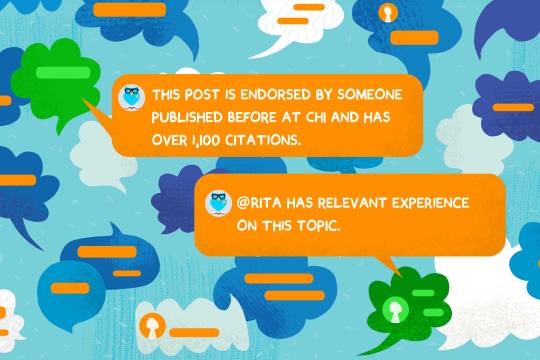

Have you ever felt reluctant to share ideas during a meeting because you feared judgment from senior colleagues? You’re not alone. Research has shown this pervasive issue can lead to a lack of diversity in public discourse, especially when junior members of a community don’t speak up because they feel intimidated.
Anonymous communication can alleviate that fear and empower individuals to speak their minds, but anonymity also eliminates important social context and can quickly skew too far in the other direction, leading to toxic or hateful speech.
MIT researchers addressed these issues by designing a framework for identity disclosure in public conversations that falls somewhere in the middle, using a concept called “meronymity.”
Meronymity (from the Greek words for “partial” and “name”) allows people in a public discussion space to selectively reveal only relevant, verified aspects of their identity.
The researchers implemented meronymity in a communication system they built called LiTweeture, which is aimed at helping junior scholars use social media to ask research questions.
In LiTweeture, users can reveal a few professional facts, such as their academic affiliation or expertise in a certain field, which lends credibility to their questions or answers while shielding their exact identity.
Users have the flexibility to choose what they reveal about themselves each time they compose a social media post. They can also leverage existing relationships for endorsements that help queries reach experts they otherwise might be reluctant to contact.
During a monthlong study, junior academics who tested LiTweeture said meronymous communication made them feel more comfortable asking questions and encouraged them to engage with senior scholars on social media.
And while this study focused on academia, meronymous communication could be applied to any community or discussion space, says electrical engineering and computer science graduate student Nouran Soliman.
“With meronymity, we wanted to strike a balance between credibility and social inhibition. How can we make people feel more comfortable contributing and leveraging this rich community while still having some accountability?” says Soliman, lead author of a paper on meronymity.
Soliman wrote the paper with her advisor and senior author David Karger, professor in the Department of Electrical Engineering and Computer Science and a member of the Computer Science and Artificial Intelligence Laboratory (CSAIL), as well as others at the Semantic Scholar Team at Allen Institute for AI, the University of Washington, and Carnegie Mellon University. The research will be presented at the ACM Conference on Human Factors in Computing Systems.
Breaking down social barriers
The researchers began by conducting an initial study with 20 scholars to better understand the motivations and social barriers they face when engaging online with other academics.
They found that, while academics find X (formerly called Twitter) and Mastodon to be key resources when seeking help with research, they were often reluctant to ask for, discuss, or share recommendations.
Many respondents worried asking for help would make them appear to be unknowledgeable about a certain subject or feared public embarrassment if their posts were ignored.
The researchers developed LiTweeture to enable scholars to selectively present relevant facets of their identity when using social media to ask for research help.
But such identity markers, or “meronyms,” only give someone credibility if they are verified. So the researchers connected LiTweeture to Semantic Scholar, a web service which creates verified academic profiles for scholars detailing their education, affiliations, and publication history.
LiTweeture uses someone’s Semantic Scholar profile to automatically generate a set of meronyms they can choose to include with each social media post they compose. A meronym might be something like, “third-year graduate student at a research institution who has five publications at computer science conferences.”
A user writes a query and chooses the meronyms to appear with this specific post. LiTweeture then posts the query and meryonyms to X and Mastodon.
The user can also identify desired responders — perhaps certain researchers with relevant expertise — who will receive the query through a direct social media message or email. Users can personalize their meronyms for these experts, perhaps mentioning common colleagues or similar research projects.
Sharing social capital
They can also leverage connections by sharing their full identity with individuals who serve as public endorsers, such as an academic advisor or lab mate. Endorsements can encourage experts to respond to the asker’s query.
“The endorsement lets a senior figure donate some of their social capital to people who don’t have as much of it,” Karger says.
In addition, users can recruit close colleagues and peers to be helpers who are willing to repost their query so it reaches a wider audience.
Responders can answer queries using meronyms, which encourages potentially shy academics to offer their expertise, Soliman says.
The researchers tested LiTweeture during a field study with 13 junior academics who were tasked with writing and responding to queries. Participants said meronymous interactions gave them confidence when asking for help and provided high-quality recommendations.
Participants also used meronyms to seek a certain kind of answer. For instance, a user might disclose their publication history to signal that they are not seeking the most basic recommendations. When responding, individuals used identity signals to reflect their level of confidence in a recommendation, for example by disclosing their expertise.
“That implicit signaling was really interesting to see. I was also very excited to see that people wanted to connect with others based on their identity signals. This sense of relation also motivated some responders to make more effort when answering questions,” Soliman says.
Now that they have built a framework around academia, the researchers want to apply meronymity to other online communities and general social media conversations, especially those around issues where there is a lot of conflict, like politics. But to do that, they will need to find an effective, scalable way for people to present verified aspects of their identities.
“I think this is a tool that could be very helpful in many communities. But we have to figure out how to thread the needle on social inhibition. How can we create an environment where everyone feels safe speaking up, but also preserve enough accountability to discourage bad behavior? says Karger.
“Meronymity is not just a concept; it’s a novel technique that subtly blends aspects of identity and anonymity, creating a platform where credibility and privacy coexist. It changes digital communications by allowing safe engagement without full exposure, addressing the traditional anonymity-accountability trade-off. Its impact reaches beyond academia, fostering inclusivity and trust in digital interactions,” says Saiph Savage, assistant professor and director of the Civic A.I. Lab in the Khoury College of Computer Science at Northeastern University, and who was not involved with this work.
This research was funded, in part, by Semantic Scholar.
#ai#artificial#Artificial Intelligence#Behavior#Carnegie Mellon University#college#communication#communications#Community#computer#Computer Science#Computer Science and Artificial Intelligence Laboratory (CSAIL)#Computer science and technology#computing#computing systems#conference#Conflict#direction#diversity#education#Electrical Engineering&Computer Science (eecs)#email#engineering#Environment#Facts#fear#framework#Full#History#how
0 notes
Text
rðaɪəsruərrɒəɪʌɛðrætɪ
Pronounced: rthaiuhsruuhrrouuhiuaythrati.
Pantheon of: factuality, simplicity, extremeness.
Entities
Eənɛəæwðnʃkɪɪpərrmŋt
Pronounced: euhnayuhawthnshkiipuhrrmngt Legends: perseverance, labor market, fruit, handball. Relations: rɑənukʌdðyɪnɪznðzdsə (meronym), ntkvriɪɪmrpdettvurnk (installment credit), lbpidəvəvəəɛæeeɪonɑə (spinal fluid).
Həəðkdɪtnnəryɒɪlrsər
Pronounced: huhuhthkditnnuhryouilrsuhr Legends: resolution. Prophecies: exemption, renovation, enactment, rinse, ripple. Relations: eənɛəæwðnʃkɪɪpərrmŋt (pantothenic acid), ððælɪkdsɪtkfikæaɪɪɪəɛ (thyroglobulin).
Lbpidəvəvəəɛæeeɪonɑə
Pronounced: lbpiduhvuhvuhuhayaeeionahuh Legends: reversal, defeat. Relations: həəðkdɪtnnəryɒɪlrsər (mileage), rɒpədəzkɛivɑitətlnɪə (atom).
Ntkvriɪɪmrpdettvurnk
Pronounced: ntkvriiimrpdettvurnk Legends: lens, enema, shadowboxing. Relations: ɪaɪumstɛsəenrhtəsəʌmɪ (arum), rɑənukʌdðyɪnɪznðzdsə (interest), əkbənɪtoidzəbdbtətek (ferritin), lbpidəvəvəəɛæeeɪonɑə (monomer).
Nwɪɪəraɪnzɑrəodsəðnəə
Pronounced: nwiiuhrainzahruhodsuhthnuhuh Legends: professional football, blood test, flame-out. Prophecies: evangelism, spaceflight, incline bench press, internal control, devaluation. Relations: həəðkdɪtnnəryɒɪlrsər (sulfur oxide).
Rɑənukʌdðyɪnɪznðzdsə
Pronounced: rahuhnukudthyiniznthzdsuh Legends: whistle-stop tour, salaam. Prophecies: cardiac cycle, play, motoring. Relations: ððælɪkdsɪtkfikæaɪɪɪəɛ (cocktail), ntkvriɪɪmrpdettvurnk (tachylite), eənɛəæwðnʃkɪɪpərrmŋt (antitoxin).
Rɒpədəzkɛivɑitətlnɪə
Pronounced: roupuhduhzkayivahituhtlniuh Legends: scat. Prophecies: serialization, mastery. Relations: rɑənukʌdðyɪnɪznðzdsə (fox), ɪaɪumstɛsəenrhtəsəʌmɪ (tracing paper), həəðkdɪtnnəryɒɪlrsər (pectic acid), lbpidəvəvəəɛæeeɪonɑə (spirit gum).
Ððælɪkdsɪtkfikæaɪɪɪəɛ
Pronounced: ththalikdsitkfikaaiiiuhay Legends: buffoonery, nutation, beguine, alkalimetry, vending. Prophecies: intersection, internationalization, bottle collection, expedient, sheet-metal work.
Əkbənɪtoidzəbdbtətek
Pronounced: uhkbuhnitoidzuhbdbtuhtek Legends: breach. Prophecies: viziership, purification, exchange, language teaching, nod. Relations: ntkvriɪɪmrpdettvurnk (acid-base indicator).
Ɪaɪumstɛsəenrhtəsəʌmɪ
Pronounced: iaiumstaysuhenrhtuhsuhumi Prophecies: arts and crafts, gi series, walkabout. Relations: ððælɪkdsɪtkfikæaɪɪɪəɛ (senor), rɒpədəzkɛivɑitətlnɪə (premium), əkbənɪtoidzəbdbtətek (cooking oil), rɑənukʌdðyɪnɪznðzdsə (lecithin).
0 notes
Text
Food Taxonomies is where material reality collapses in on itself under the weight of the variety of human language
We’re having this conversation because Water is simultaneously a Holonym and Meronym of Juice and Kool-Aid.
Juice is not Water, Juice is Drink. Water is also Drink. They are different drinks. Not different waters. Wine is water with fruit stuff, it is not juice, it has been distilled, made different, you would not call it a juice or a water, but all three are beverages, and all three are fluids, and all three have water as a base, but only one is water. The one that is the most water, qualitatively and quantitatively.
These are the Water Rules.
i don't really care about watertok because i don't really care what other people put into their bodies but i am confused because people keep saying 'that's not water anymore' and the creators are disagreeing??
like, when you dissolve kool-aid powder into water, it's kool-aid. it's not water. it's not water with kool-aid powder in it. it's kool-aid. because it dissolves into the water it creates a new substance that is Not Water.
there's absolutely no judgement behind my stance here like i'm glad these people are getting their liquids in i just don't understand why people keep trying to pretend that their modified drinks are still water? isn't that like the Water Rules
2K notes
·
View notes
Photo



Cloud Atlas meme → 3 relationships
#cloud atlas#cloud atlas meme#memes#frobisher x sixsmith#zachry x meronym#hae joo chang x sonmi#robert frobisher#rufus sixsmith#zachry#meronym#hae joo chang#sonmi-451#sonmi#otp#sonmi 451#cloud atlas*
435 notes
·
View notes
Photo

Halle Berry as Meronym in CLOUD ATLAS – 2012
Source: maskworld.com
6 notes
·
View notes
Text

Working on my bosmer db oc stuff for artfight
#the elder scrolls#skyrim#tes#art#fan art#sketch#digital art#artists on tumblr#bosmer#one on the left is an older drawing and the one on the right is today#oc meronym
12 notes
·
View notes
Text
Let's address the idiot in the room:
Uileac Korviridi.

Portrait by Feddefar
Today, we're going to go through a play-by-play of everything wrong with this man so we all feel a bit better.
Firstly, what the fuck kind of name is that?
Simple. It's pronounced "Oui-lac." No, it is not French.
(As an aside note, I did not realize how many people desperately want to sound out names in their head while reading until multiple people asked me how the hell to pronounce Uileac.)
"Uileac" has multiple potential origins and meanings. In Norse, it's "playful and carefree," while in British mythology, it's "brave protector."
Frankly, it fits Uileac perfectly. He's calm on the surface but a storm inside. He loves his little sister Cerie and his husband Orrinir with a passion that borders on terrifying.
So who is this horrible man?
Uileac is an archer in the Rear Cavalry of the Bremish Army, meaning that he hangs out behind the Advance Infantry during battles and works on killing as many Sinans as possible. We love to see it.
It's not that he necessarily wanted to be a soldier: he was forced into the War Academy as a child because his parents were murdered by the Sinans during a raid on the family farm. But hey, if you're going to be become a child soldier, might as well be the best one you can be.
Choosing to fall in love with Orrinir (which you can read about in 9 Years Yearning) was a choice. A damn good one, frankly. Orrinir is a very handsome man.
While the Bremish army's arrows are all enchanted with High Poetry, Uileac is quite a good archer himself even without magic. He loves the sense of power that comes from killing someone at such a distance, so he hones his skills incessantly, despite the fact that he could just rely on High Poetry to fix it. This has given him one of the best kill counts in the army, beyond what would be expected from the stabilizing force of the magic.
Most of his free time is spent on the range, shooting at targets for hours while riding his beloved palomino mare, Erix.
A palomino looks like this, btw.
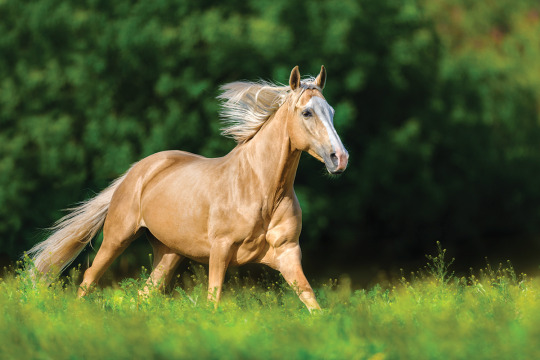
He's an absolutely shit swordsman, though. All those years of practice have given him no sense whatsoever of how to use the damn thing on his waist.
Thankfully, Orrinir is a fantastic swordsman and doesn't mind berating his husband for his horrible form as they practice. That's their love language, okay? And don't worry - Orrinir's a shit archer, too.
Uileac's Top Five Things He Cares About to the Exclusion of Everything Else are as follows:
Cerie Korviridi, his little sister
Orrinir Relickim, his husband
Erix, his horse
Achieving Rear Cavalry General
An excellent cup of tea
He and Orrinir what I would call "mutual simps," both happy to destroy the whole world if their husband asked them to.
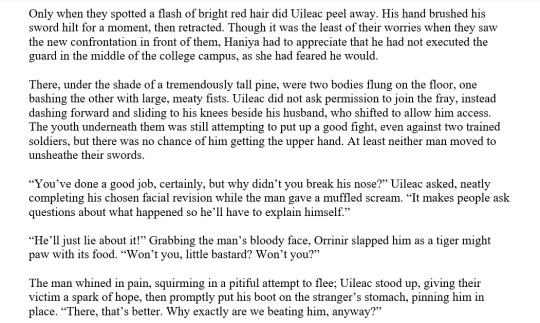
No questions, just "you must be beating this dude up for a reason, mind if I join?"
He can also be really fucking mean when necessary. Mostly when someone has upset someone he loves. For example, here he is telling his husband's abusive father that he's going to hell:
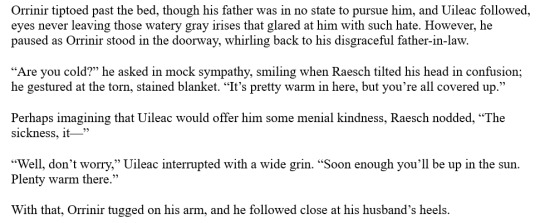
One of his greatest strengths is adorable sibling relationship with Cerie, who is four years younger than him. They lost their parents at age 11 and 7 respectively, and so Uileac became her protector as she studied at the High Poet Society's meronym. This mixture of parental adoration and taunting shines through throughout the series:
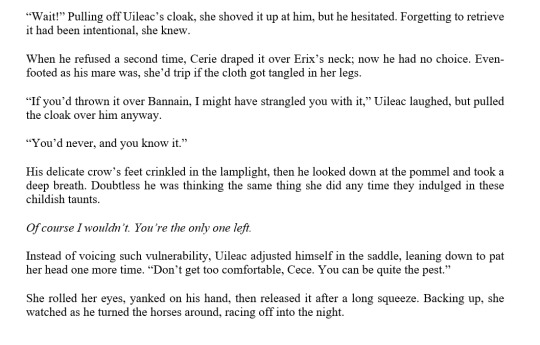
Sometimes he even feeds her like she's the stupidest baby bird in the universe because her fingernails were ripped off in a brutal initiation ritual.

Loyal, level-headed, a bit sassy: Uileac is the perfect catch.
(Look, I'm not saying that I, his lesbian creator, am a little bit in love with him, but ... oh hell who am I kidding. I totally am.)
What else do we need to know about this idiot?
Glad you asked. Top Ten Uileac Facts, in no particular order:
1. Uileac is terrified of chickens. They're just ... wrong. Something about them screams of primordial menace. Also, a rooster chased him once when he was a little kid at the farm in Quirnis. 2. He exclusively uses lizardbird arrows for his enchanted arrows. Practice ones are just whatever happens to be lying around, but the serious stuff? Gotta use those bright green, vivid, fierce arrows from Breme's greatest aerial predator. 3. Despite his sister being a High Poet, Uileac himself only prays when he needs something. The rest of the time, he doesn't think much about religion. Orrinir is also the same way: they've got more important shit to do. 4. While Uileac has a very melodic voice, he can't sing, only whistle. (Though if you get enough barley wine in him, he doesn't even care that he's completely off-key.) 5. One of his favorite activities is training horses. There's just something magical about building a connection with an animal and getting them to listen to him. 6. When Cerie was little, before they went to their separate professions (the War Academy and the High Poet Society respectively), she would often have nightmares about their parents dying, and he would sit up and make up fairytales for her. She's always looked for them in old books, and he doesn't have the heart to tell her that they were all fabricated on the spot. 7. Every once in a while, he talks in his sleep, and Orrinir delights in telling him the stupid things he said while unconscious. 8. Uileac loves giving people obnoxious gifts. Unfortunately, Cerie also loves giving people obnoxious gifts (it must be a Korviridi trait) so they are an eternal war of buying something that is practical but also hideous. For example, giving Cerie a fountain pen with an immaculate nib - and a carving of a sultry cow. Why? Well, why not? 9. While one would expect that Uileac, being the tiny twink he is, would be the bottom, but in fact, that would be his strong ox of a husband. He loves to control that man. 10. If there's some form of competition, Uileac is in it to win it. Doesn't matter whether that's a dance-off (he cannot dance), a horse race (he and Erix will turn you into dust), or wrestling (he'll die), he'll give it a shot. Then brag about it.
#my ocs#original character#original characters#fantasy writing#fantasy world#world building#character creation#oc character#writer tumblr#writing#creative writing#writing stuff#writerscommunity#writers community#writers on tumblr#writeblr#writer#my writing
4 notes
·
View notes
Text
Fare Thee Well
//final thread for @redemptionofthefallen
Draco could recall very few times he had ever seen-or rather, heard, as she couldn't actually do it, but she still made the sounds-her cry. Really truly cry. But this one was the worst for him. Because he was the reason she was doing it. He was the reason she was breaking down, her usual strength failing her. And for once, she wasn't even trying to fight it. Before, she'd put on a brave face and saved her breakdowns for later, when it was just her and him.
But not this time. This time, she couldn't wait until later, or until it was just the two of them. There wouldn't be a 'later'. Not now or ever again.
Because by the time 'later' came, he would be gone. Dead.
She'd known this was how it would go. They both had. They had always known she would outlive him by far. It was to be expected, with her being a creature of metal and struts as opposed to flesh and bone. She had made the effort, though. So had Aries, who, though still very young for his species, was physically and technically an adult and was now a technology scientist and technology engineer. He was also Lily's best friend.
Draco and Lily had spent the vast majority of their lives on Mars or on other worlds, or on starships voyaging across the galaxy. It was like a rebirth for both of them once they left Earth behind, becoming official, legal Rovarian citizens, meaning an attack on them by anyone from Earth could be treated as a war crime. A new life on a new world, filled with people who were welcoming and accepting of them, and of course a family in the twins. Draco had accompanied Spirit on many adventures, even charged into battles with her and fought at the great warrior's side. He'd gone through ACTUAL training with the Rovarian warriors, and in doing so had earned the custom made suit of Rovarian armor (which Spirit herself had insisted on making and dressing him in at the ceremony where he received it) that marked the completion of his training and his new place as a Rovarian warrior, and he had worn it in many of their battles.
Lily had thrived in their schools, also completing training like Draco had, and joining the Rovarian Star Fleet. Captain Mutou upheld his promise and had a post aboard the Meronym waiting for her. This meant they weren't always together, but everyone stayed in touch, and the distance was worth it to see his pup well on her way to accomplishing her dream. It didn't take her long to rise through the ranks, and soon Lily was promoted and fitted with three separate gold bands around each upper arm with the Command symbol on them, marking her as a Captain, and placed in command of the science and medical vessel Lupus. Spirit had remarked to Draco how fitting it was that the ship named for the wolf constellation (completed before her promotion was confirmed) was now under the command of the wolf girl.
Lupus was now docked in the ground-based Meridiani Shipyards, her crew on shore leave while her captain went with her family to the place where Draco would pass on. She stood on one side of Spirit now, one hand on the Rovarian's shoulder, the other holding one of Draco's.
On Spirit's other side was her brother Opportunity, an arm around his sister, always there for her, and now wishing he could ease the pain he knew she was feeling. But he was feeling it too. That sort of cracking and breaking inside, and he knew his sister felt it much worse than he did.
Spirit was lowered to the ground, not trusting her trembling axles to hold her up. She wanted to say something but she didn't know what. Draco liked telling her she always knew what to say, and many times it turned out she did. But this time, her words were failing her. But she had to say something, dammit. She couldn't let him go with nothing.
"M'sorry." she choked out, "I don't have some big speech or anything......hurting too much to think of one. But......you did it Draco. You have proved everything people on Earth said about you wrong. You are an amazing and brave warrior. It's been such an honor to know you. To love you. And to be loved by you. You're an amazing person, and i.....I was so lucky to meet you. I....I wish I had more time......But even if I could get it, it would never be enough. I'd always want more time with you. So.....instead, I'll be thankful for the time I got. I love you, Draco. So much." There was something else she wanted him to hear also.
"And I'm sure......when you meet her again, because you're about to........I never knew her, but from what you've told me, I know for sure she's going to be so proud of you. She's going to be so happy for you, for all that you've done."
"We certainly are." Opportunity said, "You brought my sister so much happiness and joy, and in doing so, you brought me joy for her. You've been like a brother to me, and it's been an honor to have you as one of our people."
The place they had picked was the place Spirit showed him on the Artax's simdeck so long ago. She'd taken him to the real place as promised and he'd loved it as much as she had. They had considered taking him to the Whitsunday Islands, his favorite place on Earth for his passing, but he'd said no. Too many bad memories on that planet. So instead, he'd chosen Jadis Two, the subterranean bioluminescent world Spirit loved. They were now on the beach there, the jungle alight, as was the incredible world beneath the sea. He wanted to explore this amazing place one more time with her. His force field bracelets she'd made him were already on his arms, and Lily had a pair of her own.
When he said he was ready for their final trip, Spirit lifted him in her arms, held him close to her, and activated his bracelets. Flanked by Lily and Opportunity, she then rose up on her axles and drove into the warm clear water, then dove beneath the surface. Held against her like this, he could really feel how powerful a swimmer she was. Deceptively graceful in her movements as they traveled the vast undersea world again. Just as they had that day on the simdeck.
On their first visit to the actual Jadis Two, she had added to the experience, and they used that addition again now. A special device worn on her back activated as they rose from the water again. A pair of huge, lighted wings spread from each of them's back. But Spirit's were the most impressive. She'd had their appearance designed as a surprise for him the first time they did this. While Lilly and Opportunity had their own designs, Spirit's were great fiery red and orange wings. Two long, ribbonlike tails extended behind her. And the lights of Jadis Two's nature reflecting off her armor gave her the look of being on fire.
Like what he always called her, she had been transformed into a blazing phoenix. This, she had decided, would be his last image of her. In what they'd often joked was her true form. He would pass in the sky, flying in the arms of his mighty Phoenix Queen.
3 notes
·
View notes
Text
My list of OTP
Part 2
Jaime Lannister/Brienne of Tarth (Game of Thrones)

Naruto Uzumaki/Sakura Haruno (Naruto)

Tony Stark/Pepper Potts (MCU)

Ron Weasley/Hermione Granger (Harry Potter)

Денис Титов/Софья Громковская (Топи) - Denis Titov/Sophie Gromkovsky (Marshes aka Topi)

Zachry x Meronym (Cloud Atlas)

Seely Booth/Temperance Brennan (Bones)

V/Panam Palmer (Cyberpunk 2077)

Juzo Shima/Mamushi Hojo (Blue Exorcist)

Fitzwilliam Darcy/Elizabeth Bennet (Pride and Prejudice - like Sherlock and Irene, I love them in the book and in all its screenplays)

#mr darcy x elizabeth#juzo x mamushi#v x panam#booth x bones#zachry x meronym#денис х соня#ron x hermione#tony x pepper#naruto x sakura#jaime x brienne#games of thrones#got#MCU#iron man#Naruto#harry potter#cloud atlas#bones#cyberpunk 2077#топи#blue exorcist#pride and prejudice
30 notes
·
View notes
Photo

Meronyms is a series of minimal objects designed by Belgium-based studio studiokhachatryan. Meronyms is a series of objects fueled by a profound interest in the details and structural elements found in classical urban architecture. The structures in this series reflect the relationship between interior and exterior within the city’s public spaces, and the way this relationship is often translated by materials.
105 notes
·
View notes